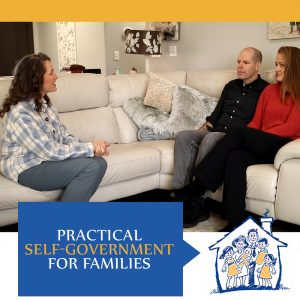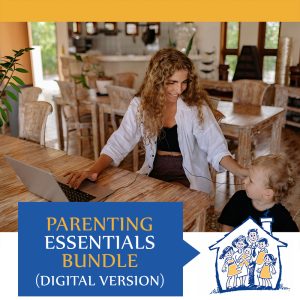Yelling At My Family: How To Break The Habit
The human voice is amazing! Think of all the things it can do. It can whisper, laugh, make animal noises, talk, sing, and yell. All these different voice tricks are useful in communicating and connecting or disconnecting with each other.
Yelling can be used for connecting or disconnecting. If I can’t find my child in the woods I can yell her name to make a connection with her. While at a soccer game, I can yell cheers from the sidelines to connect with my son and show support. But, when my child is having an attitude problem or crying and I yell, the effect is much different. At that point, I make a disconnection. It is disconnections like these that frustrate family relationships all over the world.
Question:
Nicholeen, I yell at my kids too much. I don’t really know how to stop. It seems to be a habit. Please help. Do you have any suggestions that can change this yelling addiction?
How To Stop Yelling At Your Kids
In order to stop this habit, it is important to determine why you really yell. Most parents yell for similar reasons. Which one of these reasons sounds like why you yell:
- The children don’t seem to hear me if I don’t yell
- I need to get my child’s attention
- I get frustrated and it just happens
- I have to be louder than them
- I have to yell to keep the power at home.
If you answered one, two, four, or five, then read on. If you answered number three, then proceed to the next section. If you answered all of the above, then you are like the majority of the frustrated parents these days. They find themselves doing numbers one, two, four and five so often that they end up doing number three just because they are worn down and out of control themselves. Don’t worry. There is a way to change your heart and their hearts as well as your habits.
The first mistake that most people make when relating to family members is that they try to be so efficient in their daily tasks that they stop being effective in the way they communicate. Sure, the list of things to do never ends. Hey, that’s the answer. The list of things to do never ends. So, stop trying to do them all in one day. Instead of micromanaging your children and yelling tasks from one room into another, go to the person and look into their eyes when you give them an instruction.
When a person looks into your eyes they are connected to you on a deep, even spiritual, level. They are also listening with their ears, eyes, and heart. This means that the task will get completed much better and quicker because you took the time to go to the child to make an connection.
I teach four basic skills to families all over the world. The first of the basic skills that I teach is how to follow an instruction. The first step in this essential life skill is to “look at the person.” Looking at the person is as much for the parent as it is for the child. If a child learns to follow all the steps to following instructions, as well as the other three basic skills, then the child will easily conquer issues one, two, four and five.
For instance learning how to disagree appropriately will help a child learn not to initiate power struggles. They will learn how to be understood in a calm way. A parent who doesn’t have a problem with impatience or frustration can then calmly correct the child based on the skills learned when there is a problem. The child will then ‘course correct’ quickly and painlessly.
Overcoming Frustration And Staying Calm
If you are the kind of person who struggles with becoming impatient and getting frustrated with other people, you are not alone. Most people have expectations which can end up leading to frustration when a person doesn’t perform as desired. And, if you combine expectations and daily stress the result can often be frustration and anger.
So, how do I keep myself calm when the world feels stressful and frustrating? I have taught myself some skills. Just like the children learn to follow instructions, I have taught myself how to correct properly, how to pre-teach a child before an instruction is given, and how to help another person get calm while staying calm myself.
Due to time, I can’t teach all of this right now, but I will share two skills that I learned years ago which changed my life.
First, I learned to analyze myself. I took a good look at what I do when I am about to yell. What my fists do, teeth do, and what my insides feel like. Once these things are assessed, we are able to use them as a trigger to calm down instead of a trigger to blow up. Now, when I see something crazy or stressful happening I ask myself, “Am I calm?” If the answer is yes then I move on to the second point I am going to make below. But, if the answer is no, I go get calm before I do any correcting, teaching or sorting of the chaos. I even take time to plan exactly what I will say when I handle the situation.This little bitof analysis is self-government.
Second, I learned to analyze the situation by describing instead of reacting. So, once I have determined that I am calm I start to describe what just happened. I am careful not to put any of my emotion into the description. I am also careful not to assume anything bad about the other person or their actions while describing, as this causes the other person anxiety and often starts a power struggle. Describing in this way keeps me calm. I only talk about the facts. This way, the emphasis isn’t on the person, it is on the situation. A situation is just a collection of facts, and is not nearly as offensive as a person who doesn’t live up to expectations.
Describing sounds something like this, “Just now I gave you an instruction to do your dishes, and you rolled your eyes and said, ‘whatever.” Then I describe what should have happened. “What you should have done was, look at me, keep a calm voice, face, and body, say ‘okay’ or ask to disagree appropriately, do the task immediately and then checked back…” This is what the beginning part of an effective, calm correction sounds like.
Overcoming Habits
To overcome any habit or addiction you have to make a deliberate choice and take action. After, you know the behavior has to change (because that is really what it is, a behavior; it’s not who you are) then you can start analyzing and describing instead of reacting.
Reactions control us. But, when we analyze ourselves and describe what is happening and what should have happened, then we are in control. These seem like small things, but they are giant steps toward self-government. Use your voice calmly to have the power you feel you need. There really is power in calmness.






